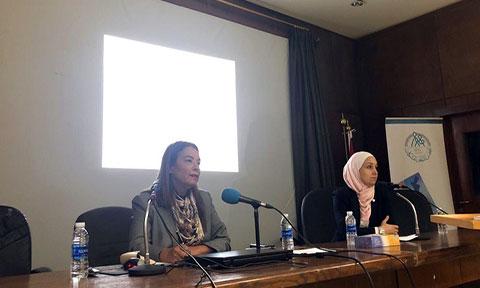

During her lecture on “population policies and the demographic dimension and their role in achieving sustainable development” which she presented to Yarmouk University’s Faculty of Mass Communication students on Wednesday, Amawi pointed out that Jordan has witnessed an increase in the population growth rate during the period (2004-2015), which increased from 2.6% to 5.3% between (1994-2004). In addition, Amawi indicated that the main reasons for this increase are due to the widening gap between birth and death rates, forced migration to Jordan and the waves of migrant workers coming from neighboring Arab countries and East Asian countries.
On the other hand, Amawi stated that despite the important achievements it made in terms of human development through investing in infrastructure and human resources, Jordan is still facing several challenges, notably the poor political stability in the Arab region and its ability to continue financing development which requires promoting private-public partnerships and partnerships with donors. Amawi stressed that despite the challenges it is currently facing, Jordan is still determined to protect the development achievements to attain a strong economy that is prosperous and inclusive, as well as focusing on redistribution of development gains by governorates, financing population programs and encouraging the private sector to actively contribute in them.
Furthermore, Amawi noted that there are population issues in the community that need programs to address them, such as, marriage under the age of 18, better targeting of the most vulnerable groups, inclusive and equitable services, strengthening health services and reproductive health programs, especially for female adolescents and young people, in order to healthy lifestyles for all.
Amawi noted that the most important national achievements in terms of youth empowerment were the preparation of the National Youth Strategy (2019-2025), the issuance of National Strategy for Human Resources Development (2016-2025) and the establishment of the National Center for the Development of Educational Curricula 2017, as well as the preparation of national standards for youth-friendly reproductive health.
Amawi pointed out that the most important challenges facing young people in Jordan are the continuous growth of youth at rates exceeding economic growth rates, which will lead to a decline in future employment opportunities, low enrollment level in vocational education due to social traditions and negative perception of professions, funding constraints and coordination challenges between the education services providers and the vocational training sector, high unemployment rates, lack of young people’s interest in entrepreneurial projects and self-employment, as well as challenges related to changing social and cultural behaviors.
Amawi stressed the need to provide funding opportunities for youth entrepreneurship projects to reduce unemployment, encourage micro, small and medium enterprises, strengthen the link between education outputs and skills acquisition and provide young people with the life skills they need to make informed decisions that respect pluralism and human rights and promote tolerance and peace.
With regard to the empowerment of women, Amawi said that Jordan has taken important steps in establishing fundamental pillars that guarantee equality between men and women to ensure greater participation for women in economic activity. However, an issue arises in this regard in relation to the actual implementation of such legislation. She pointed out that the Jordanian Constitution has laid a foundation and a starting point to consider all Jordanians as equal and without discrimination in their rights and duties. The National Charter also underlined equality and equal opportunities for citizens, both men and women.
Amawi indicated that there are a number of challenges facing women in society, most notably are the high rates of underage marriage, the low level of social services supporting women's employment such as the availability of nurseries and means of transport and communication, the poor compatibility between education outputs and labor market requirements, the high unemployment rate among females (especially those with a degree), the low economic participation levels of women, wage inequality between men and women, and the low integration of the social role of women and men which constitutes an additional constraint on their social responsibilities.
Amawi pointed to the need to unify national efforts to improve women empowerment opportunities in society to be in line with the sustainable development goals in order to help achieve more empowerment opportunities for women and protect them from all forms of discrimination and violence and to support the improvement of the supporting policy environment for their employment and economic participation through the implementation of related national plans, strategies and policies, such as the Jordan Economic Growth Plan, Jordan Vision 2025 and the National Strategy for Women..
Amawi also underlined the importance of media in supporting population and development issues due to its active and vital role in raising community awareness and garnering the support of decision-makers for these issues, which will help achieve progress and prosperity in various sectors, reflecting positively on the lives of citizens.
Dr. Ali Najadat, the Dean of the Faculty of Mass Communication at Yarmouk University, pointed out the importance of spreading awareness among university students, as the future of Jordan and one of its main pillars, about population and development issues and challenges faced by society. He also stressed the keenness of Faculty of Mass Communication at the University to provide its students with knowledge and information on various societal issues, thus contributing to enhancement and diversification of their intellectual and cognitive culture in order to help them play their media role efficiently in the future.







